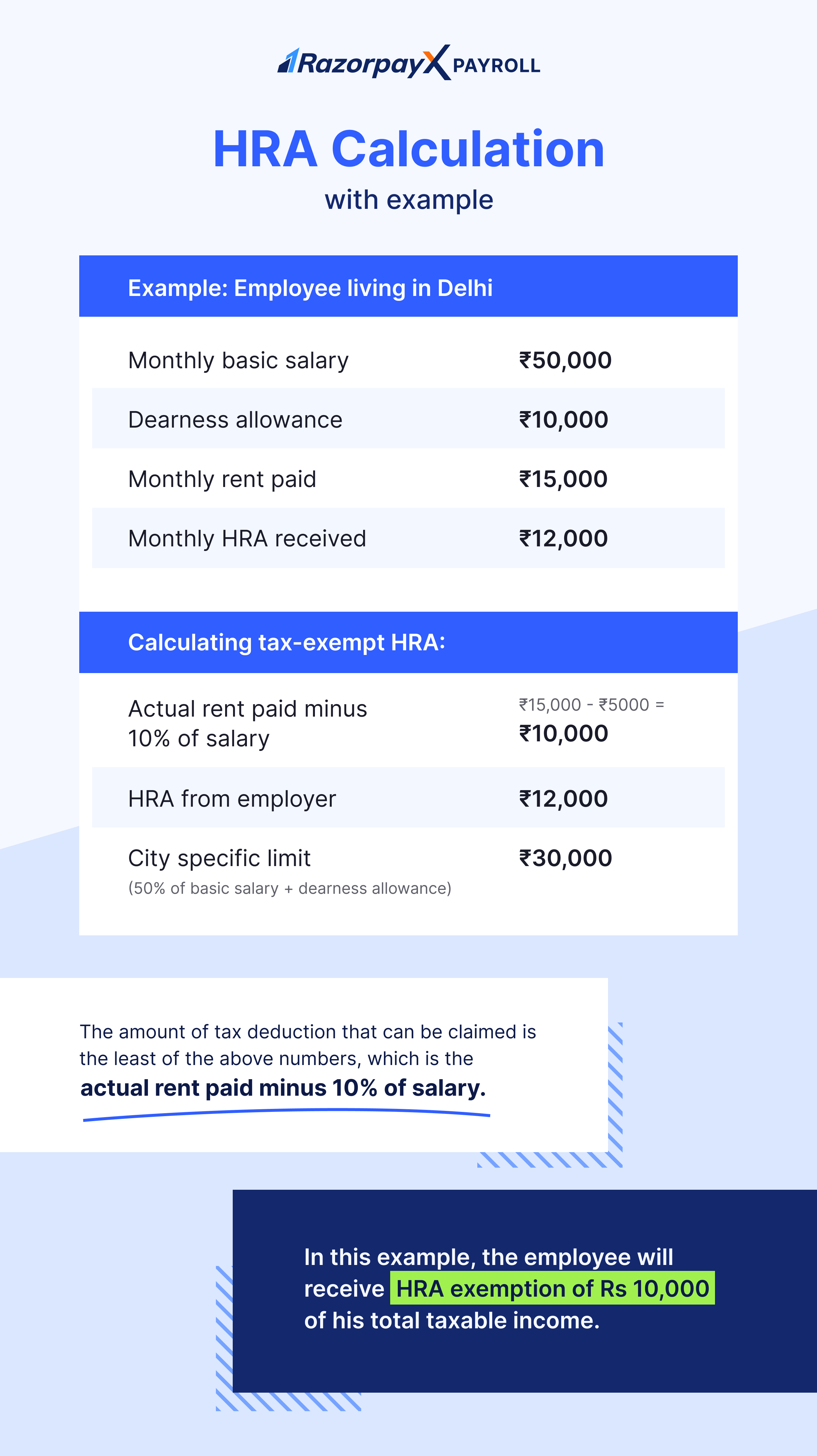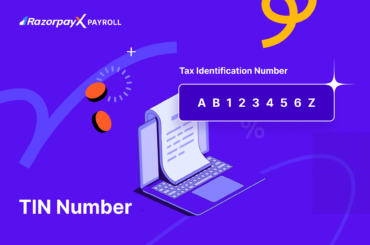Table of Contents
HRA Meaning
HRA, or House Rent Allowance, is a part of an employee’s salary provided towards expenses related to rented accommodation only. HRA is deducted from taxable salary under section 10(13A).
HRA varies from city to city. It also varies depending on the cost of living in that particular city. HRA is calculated and deducted from taxable income based on the city of residence and a few other factors.
HRA Calculation with Example
 HRA calculation involves determining the amount exempt from income tax. The amount of tax deduction that can be claimed over HRA is the lowest of the following:
HRA calculation involves determining the amount exempt from income tax. The amount of tax deduction that can be claimed over HRA is the lowest of the following:
- Actual rent paid minus 10% of salary
- HRA received from employer
- City-specific limit
- 50% of basic salary for those living in metro cities like Mumbai or Chennai
- 40% of basic salary for those not in metro cities
Let’s take the example of an employee living in Delhi.
- Monthly basic salary: Rs 50,000
- Dearness Allowance: Rs 10,000
- Monthly rent paid: Rs 15,000
- Monthly HRA received: Rs 12,000
Calculating the tax-exempt HRA:
- Actual rent paid minus 10% of salary: 15000-5000 = 10,000
- HRA from employer: 12,000
- City specific limit: 30,000 (50% of basic salary + dearness allowance)
The amount of tax deduction that can be claimed is the least of the above numbers, which is the actual rent paid minus 10% of salary.
In this example, the employee will receive HRA exemption of Rs 10,000 of his total taxable income.
Since the Rs 10,000 of HRA is exempt from tax, it essentially lowers the amount of income the government taxes the employee on. This translates to a lower tax liability for the employee.
Who Can Claim Tax Deduction on HRA?
HRA can be claimed as tax deduction if an employee meets the following criteria:
- Employee is a salaried individual
- Employee should receive HRA as a salary component
- Employee should live in a rented house
- Rent receipts should be issued in the employee’s name
Factors Affecting HRA Calculation
- Salary: Basic salary used for HRA calculation is the sum of basic salary, dearness allowance and sales commission
- HRA received: The actual amount of HRA received by the employee
- Actual rent paid: The amount of rent paid by the employee for his residence
- City of residence: The city in which the employee resides, which depends on whether the city is a metropolitan city or non-metropolitan city
Section 88GG – How to Save Tax If you Don’t Receive HRA
If you don’t receive HRA (House Rent Allowance) from your employer, there are still ways to save tax on the rent you pay. Here are some options to consider:
Section 80GG:
- This section of the Income Tax Act allows salaried individuals who don’t receive HRA and don’t own a house in the city where they work to claim a deduction for the rent paid.
- The maximum deduction you can claim under Section 80GG is the lowest of the following:
- Actual rent paid minus 10% of your basic salary
- 25% of your total income
- Rs. 5,000 per month (Rs. 60,000 annually)
Documents Required for Claiming Deduction under Section 80GG:
- Rent receipts with your name and address mentioned
- Proof of your residence (if staying elsewhere than your parents’ place)
HRA Exemption
- When the employer refuses to provide tax benefits for HRA, employees can claim these benefits at the time of filing tax returns.
- When more than 1 member of the house is contributing towards the rent, HRA related tax rebates can be claimed by all individuals as long as separate rent receipts are furnished.
HRA in New Tax Regime
Traditionally, salaried individuals could claim an exemption on a portion of their HRA, reducing their taxable income.
Under the new tax regime, introduced in 2020, claiming HRA exemption is no longer an option. This means that the entire HRA amount received from your employer is added to your taxable income.
This change simplifies the tax filing process by eliminating the need to calculate HRA exemptions.
Additionally, individuals who don’t pay rent or have low rent expenses might find the new regime beneficial as they can choose the lower tax slabs offered without claiming HRA deductions.
However, for those paying high rent, especially in metro cities, the loss of HRA exemption can translate to a higher tax burden.
Documents Required to Claim Tax Exemption on HRA
- Rent receipts with employee’s name furnished
- PAN details of the homeowner in case annual rent is more than 1 lakh. If the homeowner does not have a PAN, they can provide a self-declaration.
Automate HRA calculation using RazorpayX Payroll
After reading this article, you must have understood what a house rent allowance is and how you can claim an exemption to reduce your overall tax liability. But calculating HRA individually for each employee can be very time-consuming and tiring.
What if we told you that you could automate it for all your employees?
RazorpayX Payroll automates the process of HRA calculation and saves your precious time. It automatically divides the employee CTC into separate components in just one click. All you have to do is input the CTC and watch everything getting done by the software.
Other features of RazorpayX Payroll include:
- CTC Calculation & salary preview tool
- Automatic generation of HR letters
- Automatic compliance calculation & filings such as PF, PT, TDS & ESIC
- Automated salary calculation and disbursement into bank accounts
FAQs
Who can claim an exemption on HRA?
Any salaried individual can claim an HRA exemption. But, not all salaried people are allowed to get an HRA exemption. Only those paying rent for residential purposes can claim this benefit.
Can I claim an HRA exemption even if I pay rent to my family members?
Yes, you can claim HRA exemption even if you pay rent to your parents. But, this is not applicable to the payment of rent to the spouse. But, make sure you have all the relevant documents of proof to verify the payment.
Can tax exemption on HRA and deduction on home loans be claimed at the same time?
Yes, you can claim deduction on HRA and home loan both if you have a home loan for a house in another city and are living on rent in a different city.
Is it necessary to provide HRA to employees?
Yes. Ideally, HRA should be a part of the salary structure of the employees.
What is the full form of HRA?
HRA stands for House Rent Allowance.
What is HRA tax exemption?
HRA tax exemption is a benefit in India for salaried individuals who pay rent. It allows them to exclude a portion of their House Rent Allowance from their taxable income. This reduces their overall tax liability. However, under the new tax regime, claiming this exemption is no longer an option.
What is the formula to calculate HRA?
The HRA exemption itself isn't calculated with a formula. It's the **lowest** amount among three figures: 1. Actual rent minus 10% of your basic salary 2. HRA received from your employer 3. City-specific limit (50% of salary for metros, 40% for non-metros) This minimum value is then deducted from your taxable income.
Can I claim HRA deductions without a rent receipt?
In India, generally you cannot claim HRA deductions without a rent receipt. Rent receipts are crucial documents that serve as proof of your rent payments and are required by your employer to calculate the HRA exemption on your salary.
Can I pay rent to my spouse and claim HRA deductions on it?
Paying rent to your spouse for HRA deductions in India is possible, but tricky. Your spouse must solely own the property and the rent needs to be a verifiable transaction. They must also declare the rent as income on their tax return. The tax department may scrutinize this, so consulting a tax advisor is recommended.





